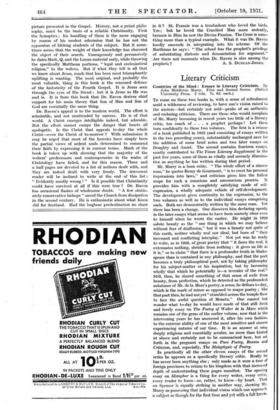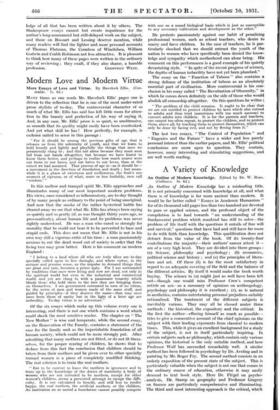Literary Criticism
To come on these two books is, with a sense of refreshment amid a wilderness of reviewing, to have one's vision raised to the austere—but certainly not arid—peaks of an authentic and enduring criticism. There are those who would complain of Mr. Murry becoming in recent years too little of a literary critic, too much of . . . a prophet perhaps ! Let them turn confidently to these two volumes. The first is a reissue of a book published in 1922 (and consisting of essays written in the two preceding years), substantially unchanged save for the addition of some brief notes and two later essays on Doughty and Amiel.: The second contains fourteen essays, mostly contributed to The Times Literary Supplement in the past five years, some of them as vitally and serenely illumina- tive as anything he has written during that period.
Mr. Murry is a born critic. " The whole effort of a sincere man," he quotes Remy de Gourmont, " is to erect his personal impressions into laws," and criticism gives him the fullest scope for such a conscious and unconscious process. It provides him with a completely satisfying mode of self- expression, a wholly adequate vehicle of self-development. The development gives continuity, to the expression, to the .two volumes as well as to the individual essays comprising each. Both are demonstrably written by the same man. Yet there has been a change. One discovers him declaring openly in the later essays what seems to have been scarcely clear even to himself when he wrote the earlier. He might in 1920 salute beauty as the " one thing in which we may believe without fear of disillusion," but it was a beauty not quite of this earth, neither wholly real nor ideal, but born of " their incessant and conflicting interplay." Not yet was he ready to write, as in 1928, of great poetry that " it faces the real, it extenuates nothing, shrinks from nothing : it gives us life as it is," or to claim "that there is a profounder truth in Shake- speare than is contained in any philosophy, and that the poet becomes a truly philosophical poet, not by taking philosophy for his subject-matter or his inspiration, but by becoming wholly that which he potentially is—a revealer of the real." Still, then, he shared something of that sense of exile from beauty, from perfection, which he detected as the profoundest substance of Mr. de la Mare's poetry, a sense, he defines to-day, which is the mark of minor as opposed to major poetry ; like that poet then, he had not yet " stumbled across the temple floor to face the awful question of Moneta." One cannot but wonder what to-day he would have made of that still fresh and lovely essay on The Poetry of Walter de la Mare which
remains one of the gems of the earlier volume, now that in the intervening years he has answered it, after his own fashion, to the extreme ability of one of the most sensitive and sincere experiencing natures of our time. It is an answer at once deeply religious and essentially secular, no more than hinted at above and certainly not to be summarized here, but set forth in the pregnant essays on Pure Poetry, Reason and Criticism, and, especially, The Metaphysic of Poetry.
In practically all the other eleven essays of the second series he appears as a specifically literary critic. Really he has never been anything else ; only made as it were a tour of
foreign provinces to return to his kingdom with that increased depth of understanding these pages manifest. The opening
essay on Metaphor is a thing for every writer, every critic, every reader to learn—or, rather, to know—by heart. That on Spenser is equally striking in another way, showing Mr.
Murry as possessing that individual vision which can approach a subject as though for the first time and yet with a full know.
ledge of all that has been written about it by others. The Shakespeare essays cannot but create impatience for the author's long-announced but still-delayed work on the subject, and those on Bossuet and Lessing deserye mention, while many readers will find tholighter and more personal accounts of Thomas Flatman, the Countess of Winchilsea, William Godwin and Crabb Robinson not less attractive. It is pleasant to think ho* many of these pages were written in the ordinary way of reviewing ; they exalt, if they also shame, a humble



















































 Previous page
Previous page